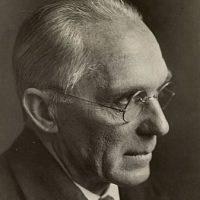

Gifford Beal (1879-1956) was a painter, draughtsman, muralist, and chronicler of American life. Influenced by French impressionism, Beal developed a unique ability to synthesize his surroundings and exude the human form’s rhythms. His scenic landscapes and lyrical depictions of the American lifestyle appealed to critics and collectors alike, and Beal achieved commercial success early in his career. He was a member of the National Academy of Design and served as president of the Art Students’ League from 1914 to 1929. As his style matured, Beal explored line and form, giving a newfound sense of weight and solidity to his compositions. In the late 1920s, he focused on austere, realistic depictions of seafaring life, using earth tones, rugged brushstrokes, and monumental forms. This period in Beal’s oeuvre coincided with the American regionalism movement and was inspired by the work of his colleagues Rockwell Kent and George Bellows. Theater and circus subjects pervaded his work in the 1940s. By observing the pictorial elements of performance, assimilating elements of abstraction, and incorporating brilliant color and light effects, he captured the glamour and energetic nature of these public spectacles. Beal’s style became increasingly free-spirited with frenetic brushstrokes, and his abstract artworks were some of his boldest and brightest during the last years of his life.
Born in the Bronx, New York, Beal studied with William Merritt Chase at age twelve, continuing his art education while he attended Princeton University in New Jersey until graduation in 1900. After marrying Maud Ramsdell, the couple vacationed in Maine and Rockport, Massachusetts, both sources for his coastal landscapes. Major exhibitions of the artist’s work have been held at the Phillips Collection, Washington, D.C.; Storm King Art Center, Mountainville, New York; and Kraushaar Galleries and the American Institute of Arts & Letters, both in New York City.